Anwesh Satpathy's Blog, page 3
September 7, 2019
Finding common ground

Millions of people around the world wait eagerly to witness an unbelievable public spectacle that takes place every 5 years. No, I’m not talking about elections. I’m talking about the Cricket World Cup. Thousands of people erupt into chanting, cheers and ritualized singing for the team. Some have quipped that, for many Indians, patriotism is only limited to cricket. The majority of us fail to understand that the collective exuberance witnessed during a sports event is not evidence of the patriotism of individuals. It is evidence of something deeper. It is, from a Durkheimian perspective, just a by product of our most basic evolutionary instincts i.e. the formation of a group.
In this piece,I’m going to argue that our moral(and by extension political)outlook of the world is influenced by factors beyond our control. I’m also going to argue that we need both liberals and conservatives for a stable society
The Blank Slate
 John Locke
John LockeJohn Locke was perhaps the earliest thinker who formulated the present form of the “blank slate” theory of human nature. Locke argued that “all materials of reason and knowledge” are derived from “experience”¹. He was targeting the then-uncontested view that human abilities were inherited from a supernatural creator. His argument was categorically against the so called divine right of the kings².
The philosopher Thomas Hobbes held a completely different view. Unlike Locke, he held a negative view of human nature. He claimed that human beings are inherently selfish and brutal. Thus, society needs a strong king to remain stable. Though he was one of the earliest proponents of the social contract theory, he still believed in absolute monarchy.
Hobbes and Locke articulated the earliest form of the “Nature vs. Nurture” debate. Who was right? The truth, as always, lies somewhere in the middle.
Defining morality
It seems imperative for an individual arguing in favor of an “innate morality” to define the “morality” itself. There is no single definition of “morality”. The neuroscientist and philosopher Sam Harries argues that morality is “a lot like chess”. In The Moral Landscape, Harris writes:-
“There are surely principles that generally apply, but they might admit of important exceptions. If you want to play good chess, a principle like “Don’t lose your Queen” is almost always worth following. But it admits of exceptions: sometimes sacrificing your Queen is a brilliant thing to do; occasionally, it is the only thing you can do.”
Defining morality in terms of individuating its contents is bound to invite debate. To avoid this problem, the moral psychologist Jonathan Haidt defines morality in terms of what it “does”. This is a descriptive and empirical definition. Haidt’s definition lays emphasis on the central value systems of communities. As he writes:-
“It’s a moral community saying, “Here are our central values, and we define morality as being about our central values; to hell with the rest of you.”³
Of Babies and Morality
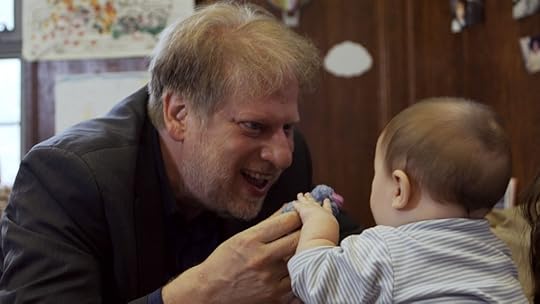 Paul Bloom with a baby(yes, its cute :) )
Paul Bloom with a baby(yes, its cute :) )The Yale psychologist Paul Bloom conducted an experiment on one year old babies in which they were made to watch a puppet show. One puppet rolled the ball to the next,who passes the ball again. The first puppet then passes the ball to a different puppet, who runs away with the ball. Then both the puppets were placed next to a pile of treats. The toddler was asked to take away the treat from one of them. The majority of babies took the treat away from the “naughty” one(the one who ran away with ball). Surprisingly enough, one baby wasn’t satisfied and went on to smack the puppet in the head!⁴
Bloom’s experiment serves just as one of the many empirical evidences for the claim that babies are born with an innate sense of right and wrong. It is not to say that they’re capable of all forms of thinking. Culture as well as self constructed understanding plays a crucial role.
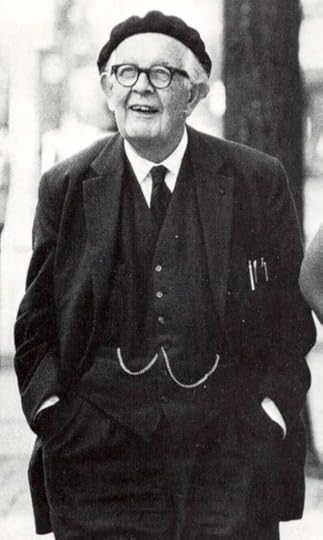 Jean Piaget
Jean PiagetThe developmental psychologist Jean Piaget argued that there are certain kinds of thinking which are neither innate nor taught by adults. Instead, these are self-constructed. For instance, kids have a proclivity to focus on a single characteristic of an object during Piaget’s preoperational stage(centration). In one of his experiments, Piaget would pour water into two identical glasses and ask kids if the volume is the same(affirmative). Then he’d pour the same water into a tall but slim glass and ask kids to compare the two. Kids below the age of 6–7 usually considered that the taller glass held more water. They fail to comprehend that the volume of water remains the same when it moves from one container to the other. No amount of teaching from adults can dissuade them from this belief until they’re past a certain age.
The Hive Switch
The ability of individual human beings to transcend their own self-interest in order to protect/become a part of the larger group(“hive switch” as Haidt terms it)has always fascinated me. Not merely because it is seems so obviously counter-intuitive but also because it often ends up harming/even eliminating an individual. From an evolutionary perspective, the replication of an individual’s gene and his survival is of primary importance.
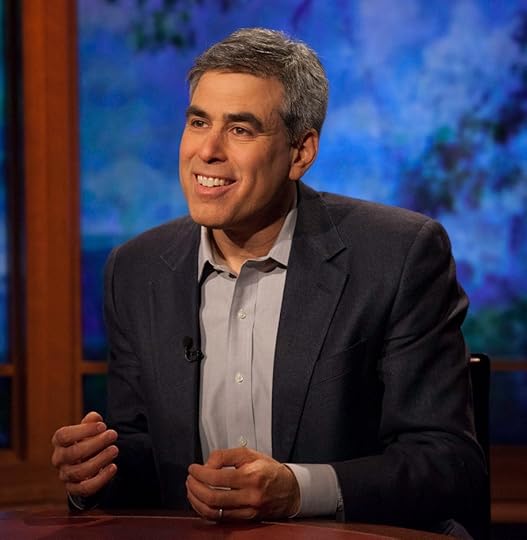 Moral psychologist Jonathan Haidt
Moral psychologist Jonathan HaidtConsider the case of Mohamed Atta, one of the ringleaders of the 9/11 attack. He came from a wealthy family and secured high scores in his university. What is it that led him to risk his life and attack the Twin Towers, killing thousands of innocent people?
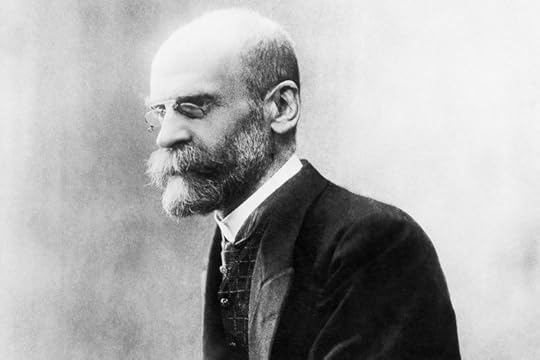 Emile Durkheim
Emile DurkheimThe answer to this was perhaps perfectly elucidated by the sociologist Emile Durkheim. According to him, individuals experience two sets of “social sentiments”⁵. The first set of which include “honour, respect, affection and fear which we may feel towards one another.”⁶. These can be explained through Darwinian natural selection⁷. The second set of social sentiments relates to the group as a whole. Dukheim wrote “When I act under the influence of the second, by contrast, I am simply a part of a whole, whose actions I follow, and whose influence I am subject to”⁸.The collective emotions(biologically,a rise in the hormone Oxytocin)that arise from the second set leads humans into the sacred realm, where the interest of the group overrides the interest of the individual. It is this “hive switch” which leads suicide bombers to do what they do.
It is, however, not true that this “collective effervescence” or a sense of belonging “connects you to the whole of cosmos”(pace the absurd New Age thinkers). It only makes you care more about the members of your own “group”. In an experiment, a group of players were subjected to a play a game which was divided into small teams. One group received Oxytocin spray while the other received a placebo spray. The Oxytocin group did exhibit making less selfish choices. But it was limited to only members of their own group. Their feelings towards members of the “out-group” didn’t change. In fact, Oxytocin triggered them to hurt members of the “other” group⁹.
Why liberals and Conservative need each other?

During the French National Assembly of 1789, members who supported the preservation of monarchy sat on the right while members who wanted change sat on the left. That’s how “Right-left” came to define “conservatives-liberals.”
Many would claim that I’m reducing politics to binaries.As I’ve argued above,politics came into being due to our innate evolutionary morality and tendency to form groups. Thus, all political debates come down to a single question:- Preserve or change?
Most of us assume that the rich naturally want to “preserve” the order(as the establishment prefers them) while the poor want to “change” things(as the establishment oppresses them). The Marxists are more often than not guilty of reducing political differences to this kind of binaries. Research has proved that this is not the case. While rich industrialists tend to vote right, tech billionaires tend to vote poor. The same goes for poor(urban poor being left and rural poor being right)¹⁰
Thus, social and economic status is not the only marker of predicting political beliefs. What should we look for, then? According to a research done by a group of psychologists, personality is a more reliable predictor of political beliefs. Conservatives are more likely to be conscientious and less likely to be open to new experience. The opposite goes for liberals, who are likely to be high in disorderliness and Openness-Intellect.¹¹
Choices in music, book, cuisine, art, movies can be used to reliably predict your political beliefs. In fact, these choices are a more reliable predictor than the household you were raised in!
Jonathan Haidt illustrates this with the example of two fraternal twins. Both are raised together and attend the same school. The brother is described as being a model student who conforms to the norms while the sister is described as being a creative but rebellious girl who constantly argues with teachers. As they grow older, the sister moves into a large city while the brother stays in the same city and studies in a state university. He becomes an integral part of the local church. The brother resonates with “country first” slogan while the sister becomes a democrat. Moving into a big city means encountering the unknown, chaos and a diverse people(openness to experience, which is positively associated with liberalism). Arguing with teachers and rebelling against the norm is a sign of being “disorderly”. All of these choices were influenced by their personality which in turn is the result of genes over which they have no control.
Liberals lack “moral capital” i.e. the ability of a society to form shared values, norms and beliefs that suppress or regulate selfishness and enable cooperation(Haidt). Totalitarian liberal narratives,for instance, invoke a sense of break with the past and advocate for the creation of utopia. This is also the reason why totalitarian communist states almost always break down on their own. They try to make too many changes too rapidly. It is not to say that moral capital is absolutely good. Consider the case of totalitarian conservative states, which advocate a “return to the glorious past”. These states have high moral capital and brainwash their own citizens to conform to those norms.
A stable functioning society needs both liberals and conservatives. A system dominated by one always leads to totalitarianism. That’s why we need to engage in constructive political debates. A common understanding can only arise if we understand that the other person’s beliefs are motivated by intuitive and unconscious reasons. Let us all accept that often things are not as black and white as they are portrayed to be(as Shashi Tharoor quips “Fifty shades of grey can never be the title of a book on politics”). Personality differences are here to stay. We’re all stuck in the same boat. The storm will harm all of us. Therefore, lets recognize that members of the other group have something valuable to say. Let’s try to engage in friendly and decent disagreements.
Notes:-
1- An Essay Concerning Human Understanding
2- The Two Treatises of Government
3- The Righteous Mind, 2012
4- Wynn, K., & Bloom, P. (2014). The moral baby. Handbook of moral development
5-(ibid,2012)
6- Durkheim, E. 1992/1887. “Review of Guyau’s L’irreligion de l’avenir.” Trans. A. Giddens. In Emile Durkheim: Selected Writings, ed. A. Giddens. New York: Cambridge University Press.
7- Boehm, C. (2012). Moral Origins: Social Selection and the Evolution of Virtue, Altruism, and Shame
8- Durkheim, E. Ibid
9- De Dreu, C. K., L. L. Greer, M. J. Handgraaf, S. Shalvi, G. A. Van Kleef, M.Baas, et al. 2010. “The Neuropeptide Oxytocin Regulates Parochial Altruism in Intergroup Conflict Among Humans.” Science 328:1408–11.
10- Kinder, D. E. 1998. “Opinion and Action in the Realm of Politics.” In Handbook of Social Psychology, 4th ed., ed. D. Gilbert, S. Fiske, and G. Lindzey, 778–867. New York: McGraw-Hill
11- Jacob B. Hirsh , Colin G. DeYoung , Xiaowen Xu , and Jordan B. Peterson. Compassionate Liberals and Polite Conservatives: Associations of Agreeableness With Political Ideology and Moral Values. In Personality and Social Psychology Bulletin. 2010.

June 9, 2019
Slaying the God of the left:-The Battle against science, beauty and politics
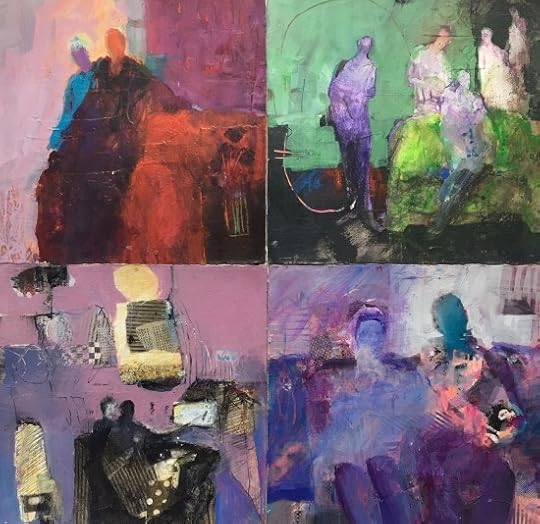
I thought God was dead. I stopped believing in God when I was 14 after much introspection and reasoning. Faith, I found out, was in its essence the belief in extraordinary claims with little to no evidence. For believers, reason and evidence are not important. Their belief is rooted in trust, often blind trust.
Nietzsche predicted that the death of God would lead to the eradication of all things sacred. Before Nietzsche, Dostoyevsky famously proclaimed that everything would be permitted in the absence of God. Nietzsche believed that God’s death would inexorably lead to the veneration of man as the sacred replacement.
He was only partially correct. In the past I have written about the disrelishing of science by conservatives. This disease has contagiously spread to the left now. In this piece, I will examine the sacred tenets of the left and demonstrate the consequences of believing it. These tenets are supported by no scientific evidence but taken as an article of faith among the radical left. In other words, these tenets are an indispensable part of the doctrine of the Church of postmodernism and the radical left.
The battle against ScienceBoth the left and the right engage in the denial of scientific facts which doesn’t align with their ideology. The threat, however, is more apparent from the left. Almost all the conservative pseudoscience has been pushed to the fringe and is no longer capable of having any real effect on the academia. Take for instance, the pseudoscientific theory of Intelligent Design, whose proponents tried to present it as a credible alternative to the Theory of evolution in American high school. It was a conservative Christian Republican judge who ruled the theory to be unscientific and unconstitutional(Kitzmiller v. Dover 2005). I’m not claiming that no Republican supports creationism, I’m merely pointing out that many conservatives have found a way to keep pseudoscience out of mainstream discussion.
The left, on the other hand, clearly has a hegemony over universities, think tanks and institutions. It could be partly due to the fact that political preferences are strongly influenced by personality traits, as a 2010 University of Toronto research paper by Jacob Hirsch, Jordan Peterson and Michael Kennedy confirmed.
The problem is not with liberal dominance, which has almost always been the case in educational institutions. The problem is with a voluble tiny minority of radical postmodernists who have hijacked the mainstream left. In a previous article on postmodernism, I discussed in some detail the ideological underpinnings of this movement. In this article, I will discuss the consequences of adhering to those bad ideas.
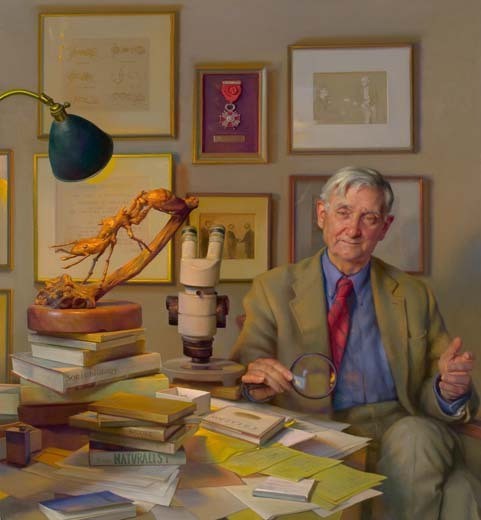 EO Wilson
EO WilsonIn 1975, the American biologist E.O. Wilson published his now well known book called Sociobiology. The book fused the ideas of John Maynard Smith, Robert Trivers and William Hamilton into a single coherent thesis. One of the main arguments of the book was that human behavior and culture are actually shaped by natural selection. This was expanded a year later by the evolutionary biologist and ethologist Dr. Richard Dawkins in his highly readable and accessible book titled The Selfish Gene. Dawkins showed that behaviors, which at first glance seem altruistic to us, are more than often the result or spandrel of an evolutionary adaptation to ensure the survival or reproductive success of the organism. This was seen as a categorical attack on the then unopposed doctrine of the “superorganism”:- the belief that the behaviors of individual organisms are entirely independent of the culture and society that they inhabit. An organization called Sociobiology Study Group was formed only to counter the claims of Dr. Wilson. This group, comprising of biologists like Richard Lewontin and paleontologist Stephen Jay Gould, published a diatribe attacking Wilson called “Against Sociobiology”. They claimed that Gould was a “determinist” whose theories “provided an important basis for the enactment of sterilization laws and eugenic policies which led to the establishment of gas chambers in Nazi Germany”. These arguments were intellectually dishonest and demonstrably false since Wilson was leftist and Trivers was a radical leftist and a sympathizer of Black Panthers. Dawkins, who has been a life-long leftist, was called the most “reductionist of sociobiologist”. Why did Richard Lewontin, a respected evolutionary biologist, attacked the likes of Wilson and Dawkins with disingenuous and dishonest attacks? The answer is provided by Lewontin himself. In his 1985 book The Dialectical Biologist, Lewontin and his co-author Richard Levins wrote “As working scientists in the field of evolutionary genetics and ecology, we have been attempting with some success to guide our research by a conscious application of Marxist philosophy.” Steven Gould, too was sympathetic to Marxism. These scientists were not motivated by a desire to seek the truth. On the contrary, they were motivated by a desire to align science with their political beliefs. The Harvard Evolutionary psychologist and linguist Steven Pinker calls them “political scientists”.
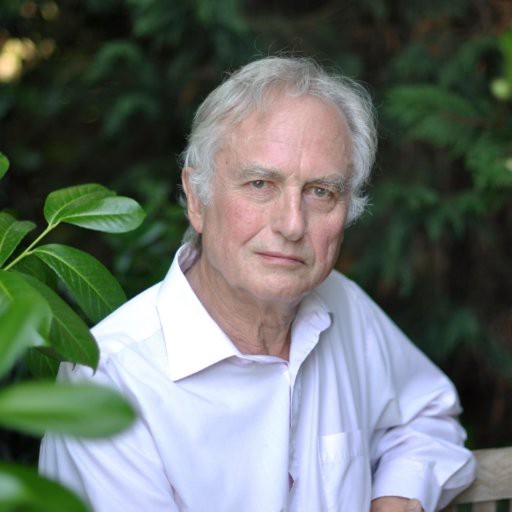 Richard Dawkins
Richard DawkinsPolitical scientists became exponentially influential after the 1980s. Every attempt to perform research on innate biological intuitions was frowned upon. The idea of an innate human nature was a direct refutation of Marx’s claim that “All history is nothing but a continuous transformation of human nature”(The Poverty of Philosophy,1847) .
The idea that the mind is a “blank slate”, as Steven Pinker terms it, provided justification for totalitarianism. For instance, Pinker points out, “If people do not differ in psychological traits like talent or drive, then anyone who is better off must be avaricious or larcenous”. Simply put, The ones who are rich, successful and talented have only been able to achieve it by oppressing the ones who aren’t. This was enough to rationalize the genocide of kulaks in Stalin’s regime.
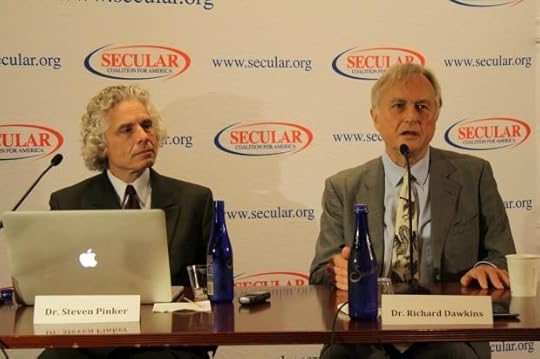 Prof Steven Pinker with Richard Dawkins
Prof Steven Pinker with Richard DawkinsThe undermining and distaste for individual rights is also derived from this doctrine(which is scientifically wrong). The radical Marxists assumed that society influenced individual behavior and therefore it was society which needed to be reformed, not individuals.
Today, however, the attack on science comes not from radical Marxists(who have become virtually irrelevant), but from postmodernists. Unlike Marxists, postmodernists do not believe in an objective truth. They see all claims as equally valid social constructs. Even scientific theories are formulated by people who are in power and are therefore baseless. They consider Science to be an ideology, just as valid as any other ideology.
This kind of reasoning has led the postmodernist Sandra Harding to refer to Newton’s Principia Mathematica as a “rape manual” and Luce Irigaray to consider Einstein’s “E=mc²” to be a sexed equation as it privileges speed of light over other speeds vitally necessary to us.
Radical postmodernist feminist also believe gender to be a “social construct”, which is preposterous. This leads them to assume that the underrepresentation of women in tech fields and the gender wage gap is solely the result of discrimination. This is demonstrably false. Take for instance, children with Turner’s syndrome, who inherit a single X Chromosome from either their father or mother. The ones who inherit X chromosome from their father(which would have defined them as girl in normal circumstances) are psychologically better at recognizing body language, emotions and socializing than the ones who inherited it from their mother(Skuse, Coppin, James et al. 1997, Nature, 705–8). Men and women generally have different interests. Men tend to gravitate towards things(tech, engineering etc.) while women tend to gravitate towards people i.e. fields like humanities, psychology, philosophy etc.(Amanda Diekman et al. Journal of Personality and social psychology, Vol 101, 902–918). It is not to say that it holds true for everyone(it doesn’t for me). However, it is generally true for people. To claim that choice plays no part at all in the under-representation of women in tech fields is credulous. Even the feminist Simone de Beauvoir said “ “No woman should be authorized to stay at home to raise her children. Society should be totally different. Women should not have that choice, precisely because if there is such a choice, too many women will make that one.”(Saturday Review, June 14 1975)
The Battle against Art and BeautyThe Humanities are in danger. Less and less people are graduating with English Literature degrees since the 1990s. In fact, graduate students and part-time faculties seem to be doing more teaching(Engell J, Dangerfield A. “The Market-Model University: Humanities in the Age of Money”). Only 9% show interest in joining the humanities on the PSAT(ibid). Less and less people are majoring in philosophy, religion, literature and the fine arts. This is partly due to the influence of science and technology. The blind abidance towards engineering is a major reason, in the Indian context. However, the problem seems to be more complex than that.
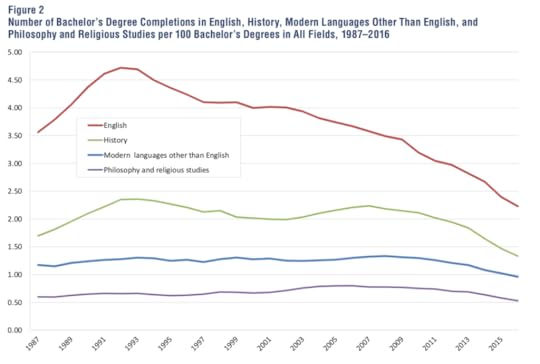 Image taken from https://www.ade.mla.org/Resources/Reports-and-Other-Resources/A-Changing-Major-The-Report-of-the-2016-17-ADE-Ad-Hoc-Committee-on-the-English-Major
Image taken from https://www.ade.mla.org/Resources/Reports-and-Other-Resources/A-Changing-Major-The-Report-of-the-2016-17-ADE-Ad-Hoc-Committee-on-the-English-MajorThe advent of YouTube, Netflix and the social media has led people to value good content more. Today millions of people watch university lectures online. Take for instance, Joe Rogan’s podcast, which regularly features long form discussions(often lasting for 4 hours) with diverse intellectual figures, philosopher, writers and scientists. These videos get more than a million views. People are more interested in humanities now more than ever. Good literature, art and movies are more accessible now.
What is the reason for the sorry state of humanities in universities? A major reason for the declining of interest in the humanities is the invasion of postmodernism. As the name suggests, postmodernism is a reaction and an extension of “modernism” which broadly includes the paintings of the postimpressionist art(Van Gogh, Cezanne, Signac). As we know, postmodernists believe that every interpretation of the world is equally valid. Art became a way to escape from the prison of reality(which doesn’t actually exist). The best way to do so was to break the connotations associated with words like “beauty”, which we are conditioned to admire by society. The artist Barnett Newman, for instance, claimed that “the impulse of modern art was this desire to destroy beauty.”(The Sublime is Now).
True to his words, Barnett produced paintings which would pass as ugly and vacuous under normal circumstances. For instance, the painting below.

If you think anybody could’ve created this, let me tell you that this painting was sold for 44 million dollars!
Another artist Andres Serrano notoriously uses feces and urine in his work. His most famous work is a crucifix immersed in his own urine in a glass tank. Following his footsteps is Chris Ofili, who stained a painting of virgin Mary with elephant dung.
Postmodern literature and movies too are characterized by deliberate abstruse prose and incomplete narrative. Whether this is a conscious revolt against great writers like Dickens and Tolstoy or a desperate attempt to hide bad writing skills is for you to decide. Let me just remind you that this gibberish is so obscure that even the so called “postmodern experts” can’t differentiate between real postmodern works and deliberate parody(See-Sokal Affair and The Grievance studies hoax).
The moment is eerily similar to the nightmare Orwell envisioned in his dystopian novel 1984. Lest we forget, in the process of torturing Winston, O’Brien tells him “There will be no distinction between beauty and ugliness.”
Ideologically possessed liberals Antifa protestors in berkeley
Antifa protestors in berkeleyWe are indoctrinating a generation of postmodernists. The humanities syllabus of almost all major universities include the postmodern ideologues. The role of education is not the pursuit of truth anymore. The point of education now is to “change the world”(as Marx termed it). Thus many Professors are actually consciously creating a generation of activists.
Faith in extreme moral relativism has made it difficult for this generation to criticize the evils that plague the world. Indeed, it has often worked detrimentally for them.
For instance, when a far left German politician Selin Goren was assaulted by 3 migrants, she lied about their identity and claimed that they were German nationals instead. Only later did she reveal their identity and “apologized” to them. Apology for what? Here is what she wrote:-
“I wanted an open Europe, a friendly one. One that I can gladly live in and one in which we are both safe in. I am sorry. For us both I am so incredibly sorry. You, you aren’t safe here, because we live in a racist society. I, I am not safe here, because we live in a sexist society. But what truly makes me feel sorry, are the circumstances by which the sexist and boundary-crossing acts that were inflicted on me, make it so that you are beset by increasing and more aggressive racism. I promise you, I will scream. I will not allow it, that this continues happening. I will not stand by idly and watch as racists and concerned citizens call you a problem. You are not the problem. You are not a problem at all. You most often are a wonderful human being, who deserves to be free and safe like everyone else.”
Her “ideological possession”(as Jordan Peterson terms it) didn’t allow her to differentiate between right and wrong. The radical left has formed implausible moral standards for itself. Individuals are defined by their group identity and groups are categorized as “oppressed” and the “oppressor”. It is this ideology which forbids them from criticizing and speaking against the gross human right violation in the Islamic World. The same Social Justice activists who criticize the almost non-existent patriarchy in the Western world refuse to criticize the rampant systematic ill treatment of women and gays in Saudi Arabia.
The pragmatic application of postmodernism will lead to a totalitarian state similar to the one Orwell envisioned in 1984. The party also didn’t believe in an objective reality. “Reality is not external. Reality exists in the human mind, and nowhere else” says O’ Brien in the same monologue to Winston.
However, we have enough reasons to be optimistic. The opposition to this also comes from liberal thinkers like Steven Pinker, Jonathan Haidt, Richard Dawkins and Noam Chomsky. It is time for the numerically larger decent liberals to take over the mainstream conversation.

May 18, 2019
Modi’s India:- The battle against secularism, facts and the Indian dream
In the 2014 Indian elections, after over two decades of running the government, the Congress led UPA coalition was finally defeated by the…
April 17, 2019
The death of journalism
Julian Assange and his tryst with freedom
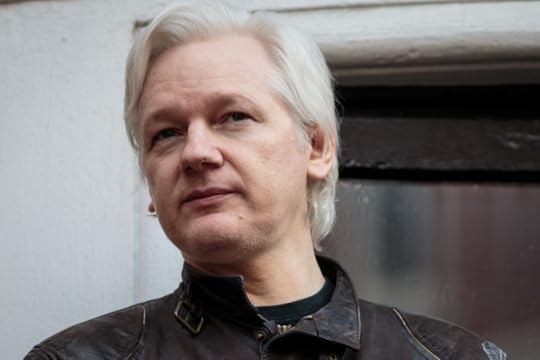
The United States of America is one of the few countries in the world actively intending to invade third world countries for the purposes of spreading “democracy”. This is strikingly similar with the ideals of the British and French colonizers, whose arrogant, supremacist and racist views led them to believe that they were “civilizing the natives” by colonizing other albeit less developed countries.
This became most apparent when the Bush administration decided to invade Iraq in the immediate aftermath of the horrendous attacks on the Twin Towers. Lest we forget, Saddam Hussain was a cruel, ruthless and genocidal authoritarian whose regime needed to be uprooted. However, President Ronald Reagan and Richard Nixon’s administration was rather sympathetic to the Saddam Hussein regime(1).
Perhaps the US did really have good intentions. The question here is not about intentions. I would have applauded the US if it would have succeeded in establishing a secular democracy in Iraq. Far from it, the invasion proved catastrophic and resulted in the loss of innocent civilians lives. None of this, however, created as huge an uproar as the Vietnam War had done. Even though the reasons for the inclusion of US in Iraq was ominously similar to the Vietnam War. The involvement was condemned by prominent intellectuals on all sides of the political spectrum(2). The most damning and irrefragable evidence of the crimes of the US was stolen and revealed through WikiLeaks.
The Genesis of WikiLeaks

WikiLeaks started with the goal of creating an “uncensorable Wikipedia” in 2006. The early version of the website looked similar to Wikipedia. Its founder Julian Assange previously hosted a free speech website called suburbia.net in the 90’s where he laid down the ideas which would later culminate in WikiLeaks.
Its declared aim is to “expose oppressive regimes” around the world and their corruption. The organization believes that “transparency leads to reduced corruption, better government and stronger democracies”(3).
In its early years, Wikileaks published a number of confidential documents and videos exposing government corruption. Some of these included videos on civil unrest in Tibet, confidential documents of the cult of Scientology, and details about the members of a fascist British party.
These leaks did help in establishing WikiLeaks as a credible organization. However, it was the leaks of 2010–11 pertaining to the Iraq War and the Afghanistan debacle that made it a household name.
The crimes of Julian Assange
 A screenshot from Collateral Murder
A screenshot from Collateral MurderChelsea Manning(formerly Bradley manning) was an unhappy person when she enlisted in army. She was bullied because of her identity. Perhaps it was partly due to her struggle with gender that she decided to publish those leaks.
In 2010, she contacted WikiLeaks on a secure instant messaging service. Over 91,731 classified documents were published by WikiLeaks on Iraq and Afganistan war. The most relevant documents were published by The New York Times and The Guardian.
 Chelsea Manning
Chelsea ManningAlong with these documents and diplomatic cables, a video of an airstrike in Baghdad was released. The video was almost 38 minutes long. Assange decided to call it “Collateral Murder”. It exposed how US helicopters engaged in indiscriminate killing of civilians. Over a dozen people were killed- including two journalists. The helicopters were shown targeting a van which had stopped to help the wounded. Two children were reported to be injured.
Of all the documents released, this video was the most shocking to the masses.
Assange’s arrest and death of journalism

On April 11, Julian Assange was dragged out of the Ecuadorian after almost 8 years of staying inside one house. After facing extradition from US, Assange was granted asylum by Ecuador in 2012. Earlier this year, WikiLeaks had promoted a website hosting leaked documents on the President of Ecuador.
It is quite probable that Assange knew about the documents and still made it a point to release them. It seems preposterous to suggest that Assange didn’t know what was coming. His pursuit of his own goals put him in danger.
Whether Assange’s activities were illegal or not isn’t the appropriate question to ask. What Mahatma Gandhi and Martin Luther King and Nelson Mandela did was illegal too. The question is whether it was morally right. The question is whether the public deserves to know the crimes of its state. The question is whether the public should be allowed to hold the government accountable for its actions. The question is whether journalists should be allowed to access information in the greater good of the citizens.
Christopher Hitchens, a staunch Marxist and a supporter of the Iraq War, claimed that Julian Assange was “ plainly a micro-megalomaniac with few if any scruples and an undisguised agenda.”(4)
Yes, Julian Assange’s agenda is undisguised. His agenda is to expose the corruption of the states through transparent free flowing of information. He is not a man who “resents the civilization that nurtured him”. He is a man who seeks out to better his own civilization by pointing out its mistakes.
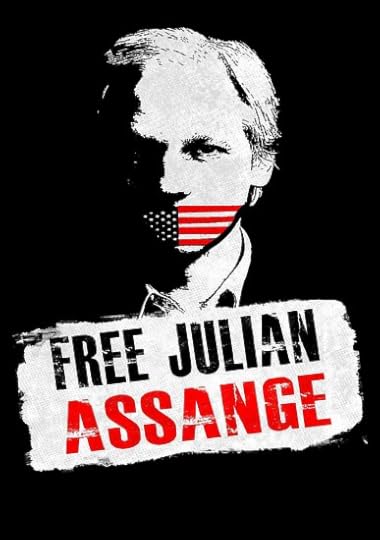
Julian Assange is not an individual anymore. He is a symbol. A symbol for the true ideals of democracy. A symbol for all responsible citizens and journalists who care about free speech. We should all stand up for Julian Assange, regardless of whether we like the man or not. Punishing him would set an example for every future conscientious citizen who wishes to reveal what’s clearly and inexcusably morally wrong.
#FreeJulianAssange
notes:
2- http://www.cbsnews.com/stories/2003/01/23/opinion/polls/main537739.shtml
War critics astonished as US hawk admits invasion was illegal
3- https://wikileaks.org/wiki/WikiLeaks:About

February 22, 2019
Why Free Speech matters
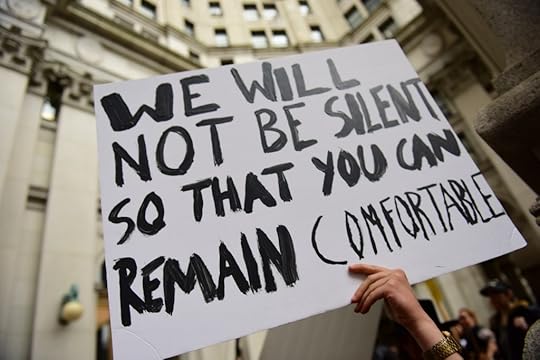
The CEO of twitter, Jack Dorsey, was recently summoned to appear before a Parliamentary panel led by BJP MP Anurag Thakur on
February 25 this year. Last year, Dorsey made a similar appearance in
US Congress defending twitter against allegations of anti-
conservative bias.
Major corporations of Silicon Valley, including Google and Facebook,
face the same allegation as well. More than half of world’s
population is now connected to the Internet. Internet and social
media have provided a platform to a diverse range of individuals to
reach millions of people instantaneously. At the same time, it has
also helped to resurrect regressive ideas of racism, white supremacy,
anti-Semitism and misogyny.
The followers of these ideas are primarily self-indoctrinated online.
Since 2016, the internet has witnessed a sudden explosion of openly
racist and xenophobic websites. It is true that some of these white
nationalist websites, like Stormfront, date back to 1996. However,
many of them gained prominence only in 2016.
In March 2010, white supremacist Richard Spencer coined the term
“Alternative Right” or “Alt-Right” to describe these racist groups. The
Alt-Right organized a rally in Charlottesville led by Spencer to
promote “Neo Nazism, white supremacy and the alt right” in August
2017. The marchers raised anti-Semitic and racist slogans while
carrying semi-automatic rifles with them. More than a thousand
protestors were estimated to be in attendance. Many counter
protestors confronted these protestors leading to a violent clash. A
self-described white supremacist deliberately plunged his car into a
crowd of counter protestors, leading to the death of one person and
the injury of 40 others.
The chairman of one of these alt right websites, called Breitbart,
later joined the Trump administration for a brief period.
Charlottesville would not have been possible without the Internet.
Ideas have consequences and bad ideas lead to bad consequences.
The moment an individual endorses direct violence through speech,
it becomes hate speech. A democratic civil society must allow its
citizens the right to express themselves, even if their ideas are
despicable. However, it should persecute its citizens if they advocate
for violence.
The utilitarian philosopher John Stuart Mill claimed that a free
exchange of ideas leads to the discovery of truth. Individuals who
claim that a view should be suppressed because it is false assume the
infallibility of their ideas. Mill argued that since human beings are
fallible, it is impossible to say that a statement is wrong only because
the majority thinks so. Opinions should not be censored even when
its wrong as the truth becomes “a dead dogma” when counter
arguments to it are suppressed.
Thoughts are collective constructs but the expression of those
constructs verbally or through writing allows you to get corrective
information from other individuals who are better informed. Free
speech allows you to make mistakes and it provides with an
opportunity to correct those mistakes.
It is important to take heed of the fact that the boundaries drawn
around free speech is often arbitrary. We must understand that
there is a distinction between offensive speech and harmful speech.
Offensive speech should be permitted but harmful speech should be
checked. The outrage against Salman Rushdie’s novel The Satanic
Verses is an example of offensive speech. Rushdie was forced to go
into hiding after the Ayatollah Khomeini of Iran issued a fatwa
permitting Muslims to kill Rushdie. A similar incident occurred when
the U.S. conference of Catholic Bishops called for a boycott of Dan
Brown’s novel The Da Vinci Code and its movie adaptation for being
“morally offensive”. Neither “The Satanic Verses” nor “The Da VinciCode” advocated for violence against any section of society but they
did offend a section of a group for their discussion of taboo topics.
Radical social change is not possible without talking about topics that
people find uncomfortable. The suppression of the rights of
individuals to express themselves results in them hiding behind a
façade of lies. We don’t want people to hide their true intentions.
We do not want racists to pretend that they’re not a racist. We do
not want misogynists to pretend that they are not misogynists. We
can only call out people for their narrow-minded opinions if we allow
them to express themselves.
A good example of why offensive speech should be permitted was
the moderate rise of the far-right racist British National Party (BNP)
in the immediate aftermath of the September 11 attacks. The BNP’s
leader Nick Griffin was able to polarize the public by raising concerns
over immigration. As a result, the BNP won an assembly seat in the
2008 London Assembly election and gained one million votes in 2009
European Parliament election. The BBC invited Nick Griffin to appear
on the popular program Question Time. Many people protested
against his appearance. On the program, Griffin was challenged and
allowed to express distasteful comments on the holocaust. Although
Griffin’s appearance dominated the headlines the next day, most of
it was negative. The BNP was exposed as a racist party and lost its
popularity. The BNP wouldn’t have been exposed as a racist party if
its leader wasn’t allowed to express his opinions freely. Free speech
is the backbone of a democratic society. Without it, our society will
be in shambles.

February 18, 2019
What the Pulwama attack reminds us about Pakistan
What the Pulwama attack reminds us about Pakistan

The recent terror attack in Pulwama has sent shockwaves to the entire nation. In a rare display of unity, all the political parties have come together to unequivocally support the Indian government and our forces.
The attack serves as a reminder of the nature of the state of Pakistan. The infiltration of Pakistani Pathan tribesmen backed by the Muslim League into Jammu and Kashmir started only days after India’s independence. Since then India and Pakistan have fought three major wars for this issue.
Pakistan continues to remain one of the only major democracies in the world to use terrorism as a weapon of war.
The problem with Pakistan seems to be that it is not a normal democracy. It is a democracy where the army exercises more power than the democratically elected government. There seems to be two sets of methods to resolve the conflict i.e. attack against the perpetrators of terror or diplomatic dialogues to resolve the conflict non-violently. Those who advocate for the former seem to forget that the complete elimination of terror is not possible as long as Pakistan continues to back terrorists while those who advocate for the latter ignore the authoritarian nature of Pakistan’s army. A third method suggested by some policymakers is isolation of Pakistan from major forums. While this method might yield some result, it also has the potential to backfire. Given the propensity of terror elements in Pakistan to provoke, they might plan for more immediate attacks on our soil. We simply cannot afford to ignore Pakistan as it can dangerously affect the life of our civilians.
We must take cognizance of the fact that there are many common civilians of Pakistan who are as frustrated by the theocratic and authoritarian nature of their democracy as their Indian counterparts. Many of them look up to India as a land of opportunities. The civilians of Pakistan who wish to come to India are often genuinely captivated by the country. This might not be true for every Pakistani citizen who applies for visa, but it is true for many. As a generous secular democracy, we must ensure that the artists, musicians and actors of Pakistan who are legitimately interested in increasing our cultural and social ties get priority. At the same time, we must forestall all prospects of diplomatic dialogue with Pakistan’s government until it takes stringent action against terrorist organizations and their leaders, many of whom are allowed to roam freely.
In the past, India’s refusal to engage in dialogue has resulted in some results. For instance, in the immediate aftermath of 26/11, Pakistan detained Lashkar-e-Toiba’s leader Zakiur Rehman Lakhvi after India refused to engage in dialogue. However, Lakhvi was later released on bail, much to the utter dismay of India and the United States.
According to the Pew Research Centre, more than half of Pakistan’s citizens think they have no influence over the actions of government. The same poll also concluded that support for democracy in Pakistan is among the lowest in the world. 54% of Pakistan’s citizens think religious leaders should have “some influence” or a “major influence” in government policies.
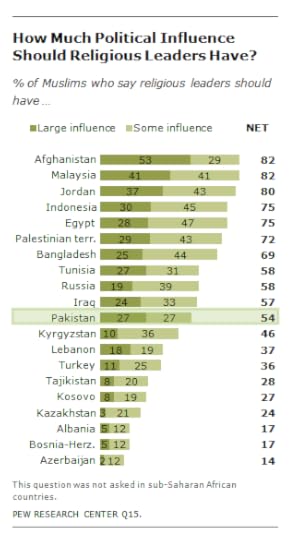
Pakistan’s tryst with democracy falls short on every account. Only one democratically elected government was allowed to complete its term in its 70 years of existence. The present Prime Minister of Pakistan has been openly sympathetic to the Islamic Fundamentalist terrorist group Taliban. In 2018, he praised the Taliban’s system of justice. In the past he has tweeted in support of Taliban, calling it “pro-peace”. His party has defended the right of Taliban to open offices all over Pakistan.
The PM of Pakistan Imran Khan has been quite willing to engage in a dialogue for peace with India. Nevertheless, his government’s reluctance to take action against terrorist groups and tacit approval of them raises serious doubts about his true intentions. As the saying goes “All hat and no cattle”.
 Imran Khan
Imran KhanBut can we really blame the Prime Minister for this? Isn’t it obvious that the democratically elected government in Pakistan cannot take any action without the consent of its Army?
The elimination of state backed terrorist groups in Pakistan necessitates a radical change in its system. The change must come from within Pakistan. India, for its part, has always wanted peace. India has always been willing to resolve the conflict. It was only due to India’s willingness to arrive at a solution through institutional and diplomatic means that the matter was moved to the United Nations. Pakistan, on the other hand, considers India to be an existential threat. Pakistani politicians continue to mobilize their population by raising the Kashmir conflict. According to Sustainable Development Policy Institute, Pakistani textbooks “insist on hate against India and Hindus. Pakistan’s existence is defined only in relation to Hindus”. This was further corroborated by the non-profit organization National Commission for Justice and Peace, which stated in its report that “Pakistan studies textbooks are an active site to represent India as a hostile neighbor”. Our neighboring country has indoctrinated a generation of young minds to hate India. Peace is not possible if both sides don’t aim for it.

January 16, 2019
Against Postmodernism:-Totalitarianism and the left
The arrival of reason
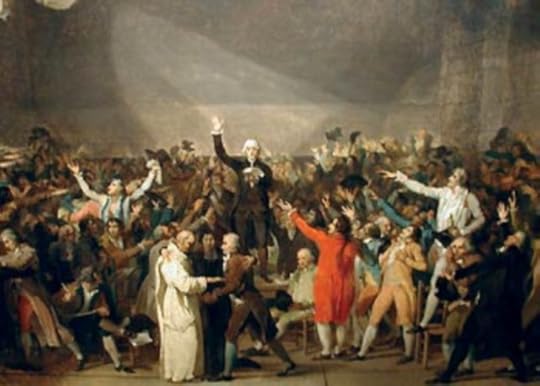
The revolution started in the early 15th century. This was the time when books became available to the hoi polloi. In Europe, the Catholic Church was being criticized and questioned by intellectuals. The Bible became accessible for the common masses to read. Many reformers, such as Menocchio from Italy, formed their own interpretation of the Christian faith that directly contradicted the official doctrine of the Catholic Church. The Catholic Church couldn’t tolerate this free flow of ideas. As a reaction, it killed thousands of heretics(including Menocchio) in the inquisition. From 1558, an index of Prohibited books was maintained by the Church
This marked the beginning of the Renaissance, which sought to create a modern civilization by reclaiming and re-interpreting ancient texts.
The Renaissance was followed by the Age of Enlightenment or the Age of Reason. The enlightenment thinkers like Voltaire, Spinoza and Hume were openly critical of the Christian Faith. Unlike the Renaissance, the enlightenment ushered in new forms of living and politics. The ideas of democracy, individual liberty, reason, science and progress were the result of this movement.
The legacy of the enlightenment is the world that we inhabit currently, which is, by all accounts far better than it ever was(Enlightenment Now, Pinker).
The antinomies of reason
 Immanuel Kant
Immanuel KantImmanuel Kant was one of the earliest philosophers to discard objective truths. He thought that reason had its limits. He sought to demonstrate this in his 1781 book Critique of Pure Reason. He called these antinomies, or, contradictions which necessarily follow from an objective worldview. The four antinomies posed questions about the existence of God, the immortality of soul, the existence of free will and the beginning of the universe. For Kant, both the sides had reasonable argument. The corollary of which meant that the world is essentially subjective.
The existentialist Soren Kierkegaard went a step further. He argued that it was necessary to crucify reason and leap into faith. Friedrich Nietzsche understood the dilemma between reason and faith better than anybody else in the 18th century. Yet, Nietzsche, too was critical of human reason, which he thought was “aimless, fleeting, shadowy and capricious”. Nietzsche is, arguably, the philosopher admired by every postmodernist. The reason being that Nietzsche thought truth was a human construct and therefore, the consequences of a statement matters more than the veracity of it.
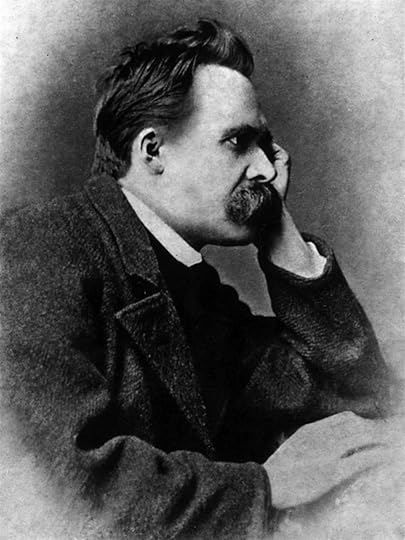 Nietzsche
NietzscheThe postmodernist movement was formed in the 1950s primarily by four philosophers i.e. Jacques Derrida, Michael Foucault, Richard Rorty and Jean-Francois Lyotard. All four of them saw world through the lens of a poet. The pragmatic postmodernist Richard Rorty saw himself as the “auxiliary to the poet” instead of a physicist(Contingence,Irony and Solidarity). A scientist forms his worldview according to the best available evidence. He/she abandons a theory if its proven to be wrong. The poet, on the other hand, wants to create a world which makes him feel things he wants to feel. Perhaps, the postmodern literary theorist Stanley Fish summarized it best when he said “Deconstruction relieves me of the obligation to be right and demands only that I be interesting”(Is there a text in this class?).
So, if objective truths didn’t matter, what was it really that formed the basis of the postmodernist view of the world? How, in other words, will we make difference between what to believe and what not to believe? The answer came through Michael Foucault. For him, truth was dependent on power. There is battle for truth going on in this world. The battle is not won by those who have the absolute truth but by those who hold the “regime of truth”(Paul Rabinow, The Foucault Reader). In other words, every society has its own regime of truth decided by those in power. The task of professors, then, is not to encourage their students to question, debate and discuss ideas or to find the methodology of truth. As Frank Lentricchia says “The task of professors is to exercise their power for the purpose of social change”(Stephen Hicks, Explaining postmodernism).
The invasion into College Campuses and the contradictions
Marxism and postmodernism have formed an alliance. An unlikely alliance. Marxism, in its essence, makes predictions. It was primarily presented as a social theory which concerned facts. In other words, the early Marxists thought of themselves as social scientists observing the decay of human society into capitalist hellhole. However, every experiment to usher in the communist utopia failed. The prediction that the population of the working class will increase was also proven to be wrong. On the contrary, the population of the rich and the middle class increased while the population of the poor decreased. The jury was out:-Marxism as a theory in social science failed.
Many Marxists recognized this. Among them were Foucault and Derrida. Both of them were sympathetic to the Communist party. Foucault, was a member of the French Communist Party for a brief period. Derrida, for his part, thought that his work was based on the “spirit of Marxism”. The alliance between postmodernism and Marxism was made to save the latter from the dungeons of insignificance. (Note:-Many modern Marxists like Richard Wolff and Slavoj Zizek have formed a different approach to Marxism. I have no objection with their interpretation of Marxism).
Postmodernism gained power in the academia in the early 2013. Specific departments like gender studies, fat studies, Queer studies and African American studies etc. were formed in the spirit of postmodern neo-Marxism. The modern postmodernists seek to silence every individual they see as members of the oppressor group. For them, the world is black and white. The Truth is decided by the group who hold the “regimes of power” i.e. White Cis- gendered Men. Everyone else is a victim. If you are a white man holding an opinion that doesn’t align with the postmodern worldview, then your opinions do not count. Only the opinions of the oppressed group i.e. Blacks, Muslims, members of the LGBTQ community and Hispanics matter.
After 2013, there were violent protests against speakers and intellectuals with contrarian opinions. A militant, violent, far-left group called the Antifa was formed to execute this. In February 2017, Antifa members invaded the University of California Campus to protest against gay conservative speaker Milo Yiannopoulos. They smashed windows and pepper sprayed individuals who had come to attend the event(one of the victims was Syrian Muslim). This was only the practical application of the postmodernist theory taken to its extreme.
 2017 Berkeley Protest
2017 Berkeley ProtestIn order to prove how irrational and unscientific the postmodern studies are, three academicians sent more than 20 papers in a span of a year to well known postmodern journals in 2017–8. To no one’s surprise, 7 of those papers were accepted and one of them was even awarded. The thesis of one of those papers was that men should be trained like dogs in order to prevent rape culture, another paper was an excerpt of Hitler’s Mein Kampf which replaced the word “Jew” with “white male or whiteness”. A paper accepted by the feminist journal Hypatia suggested that “white males in college shouldn’t be allowed to speak in class (or have their emails answered by the instructor), and, for good measure, be asked to sit in the floor in chains so they can ‘experience reparations.” Here’s what one of the reviewers said about this paper “The paper is well written, accessible and clear, and engages in important scholarship in relevant ways. Given the emphasis on positionality, the argument clearly takes power structures into consideration and emphasizes the voice of marginalized groups”.(Academic Grievance Studies and the corruption of scholarship, Lindsay, Boghossian and Pluckrose)
The Intellectual Dark Web:- An antidote to Chaos
 Michael Shermer, Eric Weinstein, Heather Heying, Joe Rogan, Dave Rubin, Christina Hoff Sommers, Sam Harris, Brett Weinstein
Michael Shermer, Eric Weinstein, Heather Heying, Joe Rogan, Dave Rubin, Christina Hoff Sommers, Sam Harris, Brett WeinsteinIn early 2017, a group of intellectuals started having conversations online about the hysteria on the far left. They started engaging in philosophical debates on the validity of religion and the meaning of life. The striking thing is that these long form discussion that often spanned up to 3 hours were watched by over a million people. The members of the IDW include the Historian of Science and founder of The Skeptics Society Dr. Michael Shermer, clinical psychologist Jordan Peterson, neuroscientist Sam Harris, evolutionary biologist Brett Weinstein, Evolutionary psychologist Steven Pinker, conservative commentator Ben Shapiro, talk show host Dave Rubin, neo conservative Atheist Douglas Murray, Muslim reformer Maajid Nawaz etc. The members of this group have little in common save the willingness to engage in a respectful debate. They are united only by their opposition to identity politics, postmodernism and their support of free speech. The IDW is filling up a necessary void.
The postmodernists have already invaded the college campuses. Their rhetoric resembles the rhetoric of the Soviet Union and the Nazis. They are against freedom and individuality. They seek to create a society where the oppressor becomes the oppressed and the oppressed become the oppressors. Their intention is to transfer power from one group to another. It is necessary for every individual who loves freedom to stand up against them. A necessary element of free society is freedom of speech, respect for the value of the individual, and the importance of science and reason. Postmodernism seeks to eradicate all of it. The Philosopher John Gray thinks “we live in the dim ruins of enlightenment”. We must re-awaken the enlightenment ideas in order to create a just and free society.





